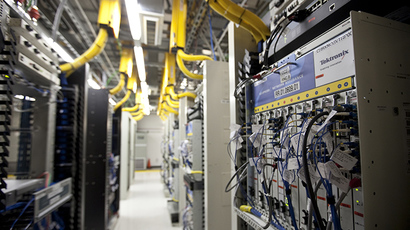IBM denies sharing client data with NSA

US technology giant IBM has fought back against speculation that the company cooperated with the National Security Agency, publishing a letter to clients Friday in an attempt to distance itself from the embattled intelligence agency.
“IBM has not provided client data to the NSA or any other government agency under any surveillance program involving the bulk collection of content or metadata,” Robert Weber, the company’s senior vice president of legal and regulatory affairs, wrote in a blog post quoted by Reuters.
“If the US government were to serve a national security order on IBM to obtain data from an enterprise client and impose a gag order that prohibits IBM from notifying that client, IBM will take appropriate steps to challenge the gag order through judicial action or other means,” he went on.
The International Business Machines Corporation is a New York City-based multinational technology and consulting company.
Nicknamed “Big Blue,” IBM provides computer software and infrastructure, along with hosting and a number of other services to customers around the globe. It is consistently ranked among the most profitable and recognizable companies in the US.
Weber also claimed that IBM had not installed so-called “backdoors” into its products like other technology companies have, either voluntarily or otherwise. The classified documents leaked by NSA whistleblower Edward Snowden implicated Facebook, Google, Apple, and a number of other Silicon Valley giants, as well as Verizon and other major telecommunication companies.
"Our business model sets us apart from many of the companies that have been associated with the surveillance programs that have been disclosed,” Weber wrote. “Unlike those companies, IBM’s primary business does not involve providing telephone or Internet-based communication services to the general public. Rather, because the vast majority of our customers are other companies and organizations, we deal mainly with business data.”
Previous reports have speculated that the NSA revelations will cost US firms $35 billion over the next several years if international companies decide to take their business elsewhere, according to Sam Gustin of Time magazine.
With over half of its revenue base coming from clients located outside the US, Big Blue has already taken a hit, watching its revenue from China alone fall by 22 percent over the second half of 2013. News of the Snowden leak convinced Beijing to encourage state-owned companies to buy Chinese products rather than the typical US technology to avoid any espionage efforts.
“Governments must act to restore trust,” Weber wrote. “Technology often challenges us as a society. This is one instance in which both business and government must respond. Data is the next great natural resource, with the potential to improve lives and transform institutions for the better. However, establishing and maintaining the public’s trust in new technologies is essential.”














